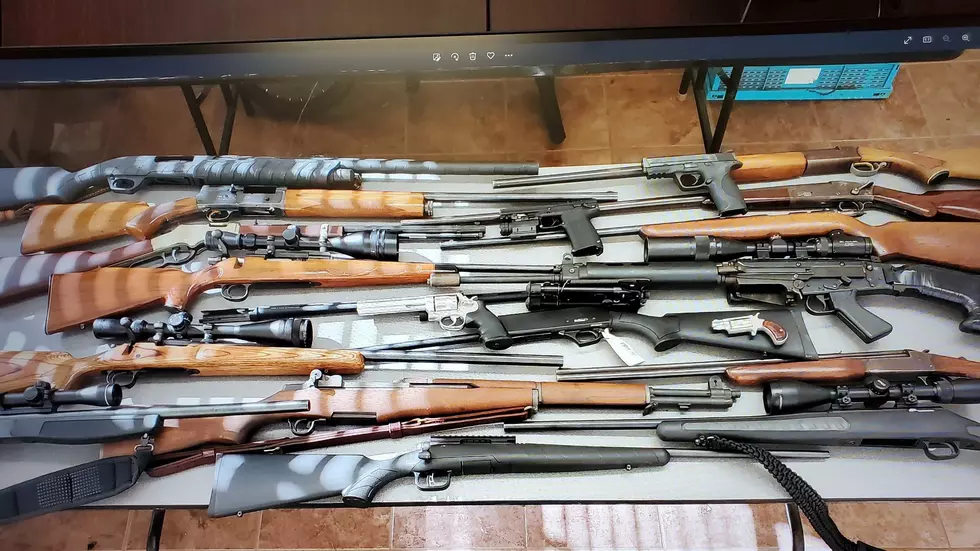
Guns, Cash and Marijuana Plants Found in Springhill PD Raid
On Wednesday, October 12, the Springhill Police Department posted on their Facebook page that they had teamed with the Webster Parish Sheriff's Office to execute a search warrant and discovered a large Marijuana Grow facility.

Along with over one hundred marijuana plants, complete with grow houses and irrigation systems, detectives confiscated a large sum of cash and approximately eighty guns and ammunition.
Though there was no mention of any current or impending arrests following the raid, comments on the Springhill Facebook page ranged from congratulatory messages to those questioning the necessity of marijuana arrests, but the comments that caught my attention were those questioning the outcome of the firearms.
What would become of those firearms? Will they be sold at auction? Are they to be destroyed?
Here's What Louisiana Law Says About Seized Firearms
I decided to do a little investigation into the matter and found the website law.justia.com and according to them, there could be a number of outcomes for the guns.
C. If the seized or forfeited firearm is contraband, the law enforcement agency shall destroy the seized or forfeited firearm.
D. If the seized or forfeited firearm is not contraband, and if the law enforcement agency knows the owner of the seized or forfeited firearm, and if the owner did not commit any violation of any federal or state law or local ordinance in which the seized or forfeited firearm was involved, and if the owner may lawfully possess the seized or forfeited firearm, the law enforcement agency shall return the seized or forfeited firearm to the owner.
E. If the provisions of Subsections C and D do not apply, the law enforcement agency shall dispose of the seized or forfeited firearm in accordance with the following provisions:
(1) If the firearm is of a type which can lawfully be possessed and used by a law enforcement agency, the law enforcement agency may dispose of the firearm in one of the following ways:
(a) The law enforcement agency may retain and use the firearm.
(b) The law enforcement agency may sell or donate the firearm to another law enforcement agency or may use the firearm as consideration or partial consideration in an exchange with another law enforcement agency.
(c) The law enforcement agency may sell the firearm to a firearms dealer or a firearms manufacturer, or may use the firearm as consideration or partial consideration in an exchange with a firearms dealer or a firearms manufacturer, provided the firearms dealer or the firearms manufacturer is licensed to buy, sell, or trade that type of firearm.
(d) The law enforcement agency may destroy the firearm.
(2) If the firearm is of a type which can lawfully be possessed and used by a private citizen, the law enforcement agency may dispose of the firearm in one of the following ways:
(a) The law enforcement agency may retain and use the firearm.
(b) The law enforcement agency may sell or donate the firearm to another law enforcement agency or may use the firearm as consideration or partial consideration in an exchange with another law enforcement agency.
(c) The law enforcement agency may sell the firearm to a firearms dealer or a firearms manufacturer, or may use the firearm as consideration or partial consideration in an exchange with a firearms dealer or a firearms manufacturer, provided the firearms dealer or the firearms manufacturer is licensed to buy, sell, or trade that type of firearm.
(d) The law enforcement agency may sell the firearm to a private citizen. A sale of a firearm to a private citizen shall be at a public auction in the same manner as a sale of surplus property. A sale of a firearm to a private citizen shall comply with all federal laws, state laws, and local ordinances which apply to that sale, and the law enforcement agency shall perform the background checks on the purchaser which are required by state and federal laws for sales of firearms by licensed firearms dealers.
(e) The law enforcement agency may destroy the firearm.
What Does All That Legal Mumbo Jumbo Mean?
If my summary of the above law is correct, the police department has a number of options. If the guns are deemed contraband, they'll have to be destroyed. If they aren't contraband, and they are legal for private citizen ownership, they could be sold to a firearms dealer, at a public auction, or they could sell them to another law enforcement agency, or just keep them for their own department.
If they do decide to sell them to the public, I'll be the first to bid on that Browning shotgun.
Inside Amazon: A Detailed History of America's Biggest Online Retailer
25 Ways to Say You're From Shreveport Without Saying You're From Shreveport
More From News Radio 710 KEEL









